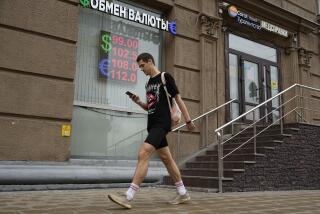Yeltsin Victory Appears to Be Fueling Long-Awaited Russian Recovery
- Share via
MOSCOW — The Russian economy showed signs of returning to life Friday after months of near-stagnation as investors, traders and tax collectors displayed new confidence in the country’s future following its marathon presidential election.
With Prime Minister Viktor S. Chernomyrdin vowing to crack down on tax evaders and the stock market posting record highs, President Boris N. Yeltsin’s successful bid for a second term this week appeared to be fueling the beginnings of a recovery that had been seen as contingent on his victory over Communist challenger Gennady A. Zyuganov.
“It’s not going to be an easy task, but I see it as being a feasible task,” said Thomas Wolf, Moscow chief of the International Monetary Fund, which has insisted that inflation be reduced and that the country’s deficit stay below 4% of the gross domestic product as conditions for supplying monthly infusions from a $10.2-billion line of credit.
“These guys are in charge now. There are signs that that has calmed the markets, which will help bring in foreign capital, which will help strengthen the ruble, which will reduce the debt--you can see a sort of virtuous circle forming.”
But luring foreign investors will take more than just Yeltsin’s name on the door of the Kremlin. And economists and business officials warn that a far more dire scenario could evolve if Yeltsin’s government fails to collect taxes to cover the high-interest debt run up during the campaign as a short-term way to cover the gaping budget deficit.
If the recently ailing president is to continue to oversee Russia’s epic transition to a market-driven economy, he may have to renege--or at least fudge the timing--on some lavish campaign promises.
Some economists have predicted an economic crisis in the fall as inflation rises in violation of the IMF pact. The steep decline in industrial output shows no sign of reversing itself, and tax revenues have been far below forecast levels in recent months.
Even new Security Council chief Gen. Alexander I. Lebed has weighed in on the economy, issuing a gloomy outlook coupled with the type of protectionist pronouncements that tend to make foreign investors uneasy.
Analysts say it is crucial that Yeltsin quickly clarify who will be dealing with economic policy and what the thrust of the policy will be. That process began this week as Yeltsin affirmed Chernomyrdin--regarded in the West as a staunch supporter of continuing reforms--as his choice for prime minister.
On Friday, Chernomyrdin told Cabinet ministers that the government must “fight tax evasion and excessive tax exemptions, be able to collect all taxes and show a less liberal approach to the offering of budget guarantees,” according to the Interfax news service.
He said one group the government plans to target is “shuttle traders,” who buy consumer goods abroad, bring them home duty-free and sell them at a markup.
Dmitri Vasiliev, chairman of a new federal commission on the securities market, announced that Yeltsin has signed a decree approving a concept for the development of a self-regulated Russian securities market aimed at attracting foreign investment.
Some wary prospective foreign investors say they will need proof of economic stability before they take a risk on Russia.
Edward Chow, director of international affairs for Chevron, who was in the Siberian city of Novosibirsk this week monitoring Wednesday’s presidential runoff, said other serious measures such as tax reforms are required to make Russia hospitable to foreign investors.
“Investors will expect this government to perform in a way we haven’t seen yet, to address the sort of problems we’ve been having,” said Chow, who has been involved in a labyrinth of negotiations over a Caspian Sea pipeline project. “Now that they have legitimacy, they need to act. The mere fact that they got reelected won’t be enough to bring more investors here.”
But Anders Aslund of the Carnegie Endowment for International Peace sounded a note of optimism. He said the budget deficit is under control at 4% of GDP and that inflation has--so far--stabilized at about 40% annually.
“I can’t see any basis for talking about an economic crisis in the fall, and those who do had better check their numbers,” Aslund said. “We should look on Russia as a market economy, and the question now is not in what direction the economy is going. The question is how fast the Russian economy will be cleaned up and how fast growth will be in the future.”
(BEGIN TEXT OF INFOBOX / INFOGRAPHIC)
Russian Economy
The collapse of the Soviet Union spawned many economic reforms. But five years later, Russia’s report card is mixed.
Russian currency (Rubles per U.S. dollar)
1992: 415
1993: 1,247
1994: 3,550
1995: 4,640
****
Real income
1992: -47%
1993: 10%
1994: 16%
1995: -13%
****
Male life expectancy
1992: 62 yrs.
1993: 59 yrs.
1994: 58 yrs.
1995: 57 yrs.
****
Industrial production
1992: -16%
1993: -14%
1994: -21%
1995: -3%
****
Inflation
1992: 2,600%
1993: 940%
1994: 320%
1995: 130%
Sources: Russian government, International Financial Statistics
More to Read
Sign up for Essential California
The most important California stories and recommendations in your inbox every morning.
You may occasionally receive promotional content from the Los Angeles Times.













